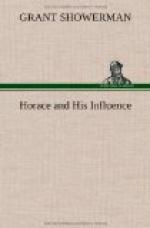The intellectual experience of Horace’s younger days was thus of the broadest character. Into it there entered and were blended the shrewd practical understanding of the Italian provincial; the ornamental accomplishments of the upper classes; the inspiration of Rome’s history, with the long line of heroic figures that appear in the twelfth Ode of the first book like a gallery of magnificent portraits; first-hand knowledge of prominent men of action and letters; unceasing discussion of questions of the day which could be avoided by none; and, finally, humanizing contact on their own soil with Greek philosophy and poetry, Greek monuments and history, and teachers of racial as well as intellectual descent from the greatest people of the past.
But Horace’s experience assumed still greater proportions. He passed from the university of Athens to the larger university of life. The news of Caesar’s death at the hands of the “Liberators,” which reached him as a student there at the age of twenty-one, and the arrival of Brutus some months after, stirred his young blood. As an officer in the army of Brutus, he underwent the hardships of the long campaign, enriching life with new friendships formed in circumstances that have always tightened the friendly bond. He saw the disastrous day of Philippi, narrowly escaped death by shipwreck, and on his return to Italy and Rome found himself without father or fortune.
Nor was the return to Rome the end of his education. In the interval which followed, Horace’s mind, always of philosophic bent, was no doubt busy with reflection upon the disparity between the ideals of the liberators and the practical results of their actions, upon the difference between the disorganized, anarchical Rome of the civil war and the gradually knitting Rome of Augustus, and upon the futility of presuming to judge the righteousness either of motives or means in a world where men, to say nothing of understanding each other, could not understand themselves. In the end, he accepted what was not to be avoided. He went farther than acquiescence. The growing conviction among thoughtful men that Augustus was the hope of Rome found lodgment also in his mind. He gravitated from negative to positive. His value as an educated man was recognized, and he found himself at twenty-four in possession of the always coveted boon of the young Italian, a place in the government employ. A clerkship in the treasury gave him salary, safety, respectability, a considerable dignity, and a degree of leisure.
Of the leisure he made wise use. Still in the afterglow of his Athenian experience, he began to write. He attracted the attention of a limited circle of associates. The personal qualities which made him a favorite with the leaders of the Republican army again served him well. He won the recognition and the favor of men who had the ear of the ruling few. In about 33, when he was thirty-two years old, Maecenas, the appreciative counsellor, prompted by Augustus, the politic ruler, who recognized the value of talent in every field for his plans of reconstruction, made him independent of money-getting, and gave him currency among the foremost literary men of the city. He triumphed over the social prejudice against the son of a freedman, disarmed the jealousy of literary rivals, and was assured of fame as well as favor.




